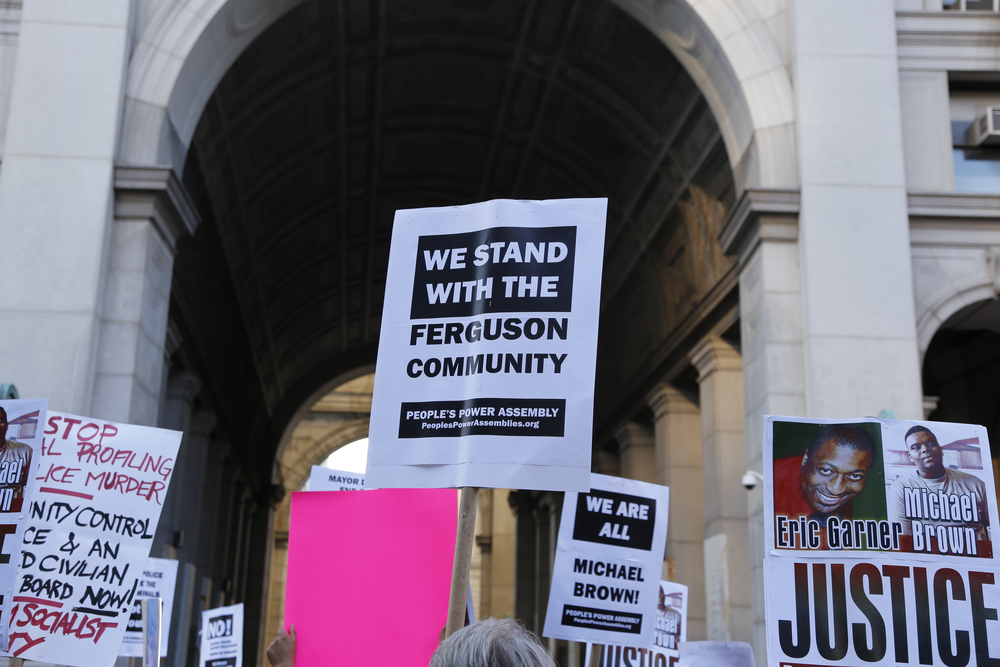Hedging is a form of slippery communication where people hedge their bets with words and phrases that give them an escape route such as: “I think”, “probably“, “maybe”, “possibly”, “I’ll try”, “can be”, and “hopefully”. We are assaulted by hedging language daily—from politicians who won’t make definite statements to leaders who won’t commit to anything to friends and coworkers who won’t level with you.
What makes hedging language slick (and devious) is that because it is so commonplace, it is seldom challenged. People who use hedging as a tactic know this. Hedging language gives people a way out, a way to avoid being held accountable for a promise or definitive position for the obvious reason: they aren’t making one or taking one.
In the News:Ferguson’s Mayor James Knowles comments on September 30, 2014 after the aftermath of the shooting death of Michael Brown received mixed reviews. Why? An important factor: He uses hedging language to: 1) avoid taking a definitive stand, and 2) to make the problem appear less significant than it is. Here’s an excerpt—notice the phrases in bold:
“I think what it showed was…even though I always knew againthat African-Americans had experiences that were frustrating, definitely frustrating, many of that never bubbled to the surface. So I think what really opened my eyes was how significant that can be for many people.”
A second excerpt shows the same use of hedging language. In an interview by Tamron Hall, host of MSHBC’s New Nation, on ______, Knowles said:
“…been looking at ways to hopefullyincrease the number of African-American applicants.”
Let’s Break It Down: When people hedge, there’s nothing to grab hold of, no solid ground to stand on. But that’s the point—the hedger always wants an escape hatch so no one can nail him or her down to anything.
We don’t know whether Mayor Knowles use of hedging language is an unconscious habit or a deliberate tactic, but the effect is still the same. Hedging produces a negative reaction leaving people feeling frustrated and upset because they never know where the speaker or leader stands. Here are several factors that contribute to this reaction:
- Using Hedging Words and Phrases Weakens Message: “Commit or do not commit—don’t hedge” is Rule Number 6 in Speak Up Show Up, and Stand Out. Mayor Knowles would be wise to apply this rule when he speaks. How about some straight forward communication such as “What it showed me” versus “I think what it showed me”. Do you think it showed you or did it show you, Mayor? One small change changes everything.
- Using Vague Words Plays down the Seriousness of the Problem: Take the word “frustrating” as it is used to describe the experiences of African-Americans in Ferguson, Missouri. Frustrating is a light-weight word with broad meaning ranging from unsatisfying to exasperating. So what is it? As listeners we don’t have a clue what is meant. But most people will perceive the word frustrated as vague and minimizing the gravity of the issue. Even when the Mayor attempts to pump up the word frustrating by saying “definitely frustrating” it is a futile attempt. The word simply does not describe the seriousness of the issue. How about changing the Mayor’s phrase from “African-Americans had experiences that were frustrating, definitely frustrating” to “African-Americans have experiences that are deeply disturbing (or upsetting)”. Notice the change from past tense to present tense which leads to the next form of hedging.
- Using Past Tense to Minimize the Problem or Implying that the Problem No Longer Exists: Mayor Knowles relies heavily on the use of past tense references such as “was,” “were,” “bubbled,” and “had”. In the phrase “African-Americans had experiences that were….” Let’s stop right here. Is the Mayor really saying that these experiences happened in the past and that they no longer occur?
- Using “Can be” instead of “Is” Makes Message Sound Hesitant: The Mayor states:“So I think what really opened my eyes was how significant that can be for many people.” Weak again. Is the Mayor implying that it is only a possibility that many people “can be” experiencing this situation as significant? A “can be” hedge provides an escape route. There is nothing you can hold the Mayor accountable for. What the Mayor is really saying with the phrase “can be” is that he’s not sure who or if this applies to anyone. Slick, huh?
Rewrite of Mayor Knowles Message: By eliminating “I think” phrases, plus past tense usage (was/were) and replacing the phrase “can be” the Mayor would have a much stronger message that would show exactly what he is committed to. Below is a new script, something the Mayor could have said if he really wanted to take a strong stand:
“…what really opened my eyes is how significant these issues are. What it showed me is that African-Americans have many experiences that are deeply disturbing to them as a culture, and they are equally disturbing to us as a community and to me personally as a leader. I missed this completely and it’s unacceptable. I let you down. My eyes are now open and I see what I need to do. I am committing today to resolve these critical issues for African-Americans and for our community as a whole. What I am asking myself is “How did I miss this? And what do I need to do differently to…. ”
Actions you can take to avoid hedging and to increase your message strength: Just as passwords have an assessment of weak to strong, so do messages. You may be using common hedging language that weakens your chance in a job interview, in getting that promotion that you want, or in getting the response you need. Here are some guidelines that will put you on a more effective path:
1) Eliminate common hedging phrases from your writing and speaking: Drop words such as “try”, “maybe”, “possibly” and hopefully”. Use direct communication and either commit or do not commit. For example, commit by saying, “I will” not “I’ll try”. Or do not commit by saying “No, I cannot commit until “x” is handled, instead of using the fallback phrase “Yes, but…” which is really a no in disguise.
2) Talk in the present tense to add power to your message: In a job interview, which is stronger: “I was a Systems Engineer” or “I am a Systems Engineer”. In talking with your boss, which is stronger: “It can be achieved” or “I will achieve this.” In talking to a coworker, which is stronger: “I had the feeling…. or “I have the feeling…. Or, an obvious one: Which is stronger with your significant other: “I was in love with you” or “I am in love with you.” Talking in a “now” time frame forces you to own what you are saying and talk in a straight forward manner. The benefits: You dramatically increase your ability to positively influence others.
3) Be precise and use words that describe exactly what you mean: Don’t water down your message or minimize your concern by using vague or tentative language. If you’re upset don’t say, “I’m a little concerned about….” Be direct and say, “I’m upset”. If you’re referring to someone else don’t dance around the issue by trying to avoid conflict or trying to be nice by saying, “perhaps you may want to consider the possibility that this may be something that could….” These words add up to a whole lot of nothing. Practice eliminating hedging language and say what you mean, such as: “I am asking you take a serious look at how your actions are affecting the team.”
Hedging language—from non-commitment words, using the past tense when the present tense is more accurate, and using non-specific language leaves people feeling uncertain, confused, and irritated. If you hedge, you have a surefire formula that sending a weak message that diminishes your power. My question to you is: “Why are you hedging and with whom?” Answer this and you’ll learn a lot about yourself. You may be avoiding conflict or you may be avoiding being held accountable.
Dr. Loretta Malandro is the CEO of the Malandro Consulting Group (www.malandro.com) and the author of several landmark business communication books published by McGraw-Hill including: Fearless Leadership, Say It Right the First Time, and her new book which is being released November 2014, “Speak Up, Show Up, and Stand Out: The 9 Communication Rules You Need to Succeed”.






